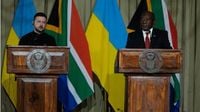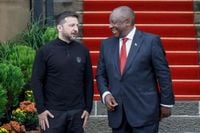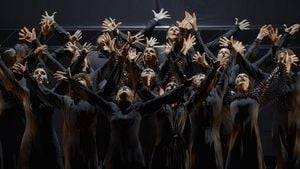Ukrainian President Volodymyr Zelensky cut his visit to South Africa short amid escalating tensions as Russia launched a series of missile and drone strikes on Ukraine. The attacks, which occurred overnight, resulted in significant casualties, with at least 12 people reported dead in Kyiv alone. Zelensky announced on the social media platform X that he would be returning to Ukraine immediately, stating, "Unfortunately, the damage is very serious," as he faced mounting pressure from U.S. President Donald Trump to accept a controversial peace agreement that many critics argue favors Russia.
During Zelensky's visit to Pretoria, he met with South African President Cyril Ramaphosa to discuss the ongoing conflict and potential pathways to peace. However, the meeting was overshadowed by protests from the pro-Russian opposition, who condemned Zelensky's presence in South Africa. Protesters gathered outside the government building, holding banners that expressed their discontent, with slogans like, "Shame on you, Ramaphosa and Zelensky." This backlash highlights the complex political landscape in South Africa, where historical ties to Russia remain strong.
Since February 2022, Ukraine has been engaged in a fierce struggle against Moscow's military offensive, receiving substantial support from European and American allies. The United Nations Human Rights Office has reported that approximately 12,910 civilians have died in Ukraine since the onset of the war, underscoring the humanitarian crisis that continues to unfold.
Ramaphosa, prior to meeting Zelensky, had a phone conversation with Russian President Vladimir Putin, expressing a commitment to jointly work towards a peaceful resolution of the conflict. However, the South African government has maintained a position of neutrality throughout the crisis, refraining from condemning Russia or voting against it in United Nations resolutions. This has led to criticism from various quarters, including the MK Party, South Africa's main opposition party, which has openly blamed Ukraine for the ongoing crisis.
Phroiyd Shivambu, Secretary-General of the MK Party, stated earlier this month that the party strongly condemned Ramaphosa's invitation to Zelensky, labeling him a "puppet" of NATO and the West. Shivambu's comments reflect a broader sentiment within the party, which views Russia as a friend and holds Ukraine responsible for provoking the current hostilities. Former President Jacob Zuma's aide, Mzwanele Manyi, echoed this sentiment, calling Zelensky the "arch-villain" of the Russia-Ukraine war and urging public protests against his visit.
Despite the protests, the South African Ukrainian Association (UAZA), representing around 1,000 Ukrainians in South Africa, expressed a contrasting view. Dzvinka Kachur, a representative of the UAZA, defended Zelensky, stating, "South Africa, like Ukraine, is a democratic country. In Russia, you cannot protest. If you take to the streets, you will be arrested or disappeared." This perspective emphasizes the importance of democratic values, particularly in light of the oppressive regime in Russia.
During the talks, Zelensky indicated that Ukraine would be willing to accept an unconditional ceasefire, but stressed that pressure must be applied to Moscow to halt its attacks. He stated, "We have not seen strong pressure from the United States on Russia to promote peace," highlighting concerns that the U.S. may not be doing enough to facilitate a resolution.
In discussing potential compromises in peace negotiations, Zelensky articulated a willingness to engage in dialogue with Russia, provided it does not violate Ukrainian constitutional principles. He remarked, "Once there is a ceasefire, Ukraine agrees to sit down with Russia for negotiations, which is already a major compromise." However, the question of who would guarantee such a ceasefire remains contentious, with Zelensky proposing that a strong NATO member should take on that responsibility.
Ramaphosa expressed South Africa's readiness to act as a guarantor of peace, stating that the country is prepared to facilitate dialogue between the conflicting parties. However, analysts remain skeptical about South Africa's ability to play a significant role in mediating the conflict. Kingsley Mahubela, a political analyst from the University of Pretoria, questioned the value of South Africa's involvement, arguing that the ongoing discussions between the U.S. and Russia exclude European allies who have a direct interest in resolving the conflict.
Mahubela cautioned against falling into the trap of choosing sides, stating, "We must never fall into the trap of any party." He expressed doubts about whether Pretoria could convince either Russia or Ukraine to commit to peace talks, especially given the MK Party's strong pro-Russian stance and allegations of receiving funding from Moscow.
As the situation unfolds, Zelensky's early departure from South Africa underscores the urgency of the conflict back home. The recent missile and drone strikes, which included 70 missiles and 145 drones aimed primarily at Kyiv, have intensified the need for effective air defense measures. The Ukrainian Air Force has reported successfully intercepting many of these attacks, but the ongoing threat remains significant.
In light of the pressures from both the Trump administration and the realities on the ground in Ukraine, the future of peace negotiations remains uncertain. Zelensky's administration continues to grapple with the dual challenges of maintaining international support while navigating the complexities of negotiations with Russia. The coming days will likely reveal more about the potential for dialogue and the role that South Africa may play in facilitating peace.
As the world watches, the interplay between global politics and local sentiments will undoubtedly shape the trajectory of the Ukraine conflict and South Africa's involvement in seeking a resolution.






